For years now,
Marcia Gay Harden has been one of the finest actresses on stage,
screen and TV. Yet, despite the fact that she has a face that
everyone knows, somehow she has never completely become a household
name.
Still, she plugs
away, having become one of the most-respected character actresses in
film – including winning a best supporting actress Oscar in
Pollock and roles in films like Miller’s Crossing, Into the
Wild and Whip It. Harden has also done fine work on
television – her guest appearance on Homicide: Life of the Street
was one of the most devastating performances ever caught on the
small screen. Not only that, but on Broadway she ended up winning
the Best Actress Tony in 2009 for God of Carnage.
Harden’s
latest role is playing the complicated, disturbed Barbara Sabich in
Scott Turow’s Innocent, which will be the first chapter of
TNT’s new Mystery Movie Night, in which the cable network
offers two hour movie versions of popular suspense novels.
The TV movie – like the book – is a sequel to the classic murder
mystery Presumed Innocent, which ended with the nasty
surprise that Barbara was responsible for the murder of her husband
Rusty’s lover. In Innocent, her character is – if possible –
even more complex. She is dead in bed as the film begins and the
audience must look back to see how exactly she died. Once again,
Rusty is on trial for the death, and once more a complex court
proceeding must determine his guilt or innocence.
A couple of
weeks before Scott Turow’s Innocent premiered the TNT Mystery
Movie Night, Harden was nice enough to talk with us and a few other
websites about the movie.
Were you familiar with, or had
you read any of Scott Turow’s books beforehand?
One L is pretty popular.
I had read [Presumed] Innocent
previously and another one that I’m spacing on the name of, but I
remember reading [Presumed] Innocent and then later seeing
it. I always try to read the literature first before I see the
piece, so I have my own ideas. [I was] really excited by his writing
and by the rhythm of his writing. The rhythm of his mystery in a
way that it just seems to crescendo or, like “Bolero,” you could say
it crescendos the more information you have. But then as you're
solving it, it deals like pick-up sticks where you try to carefully
extract one stick without unbalancing the others. That’s what the
characters seem to be doing, but the audience is involved in the
ascension, different from the game that the characters are doing. So
to pick up with this one in part two, it was very exciting to see
where they had come because now each pick up stick is bent and
twisted and full of the life they’ve lived for 20 years and another
crime is committed.
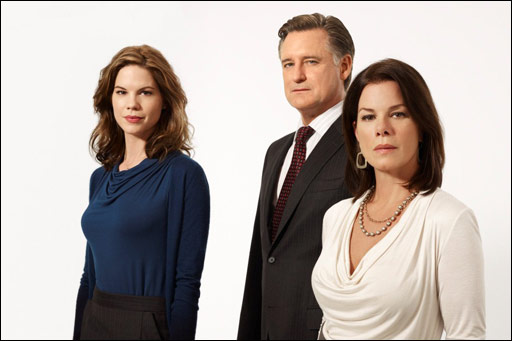 How do you connect with the
character? Is there something about her that you felt a familiarity
to or something that really touched on you with this character?
How do you connect with the
character? Is there something about her that you felt a familiarity
to or something that really touched on you with this character?
Well I felt that his writing,
Scott Turow’s writing allowed for a great exploration into the
mental illness that she suffered and the repression that she lived
through and also Rusty, her husband, lived through. He had
repressed her crime from [Presumed] Innocent, part one for
now 20 years. Her behavior doesn’t become erratic again until she’s
revisited by the same event, by an infidelity and then lack of a
distorted reality in the home as created by his lies and cheating.
She responds with the typical behaviors of her bipolarness which was
really interesting study for me. You can look at women like… let’s
say Jean Harris [a school mistress who became infamous when she was
convicted for the 1980 killing of Scarsdale Diet Doctor
Herman Tarnower] or the astronaut whose name I can’t remember, this
perfectly seemingly normal person who traveled in diapers.
Oh yes, that
lady.
Right, what was her name?
I can’t
remember her name, but I know exactly whom you're talking about. [It
was Lisa Nowak, a former NASA astronaut who in 2007 drove overnight
from Houston to Orlando in an attempt to kidnap a romantic rival in
a love triangle. Nowak has since denied early reports that she wore
diapers so she would not have to stop to go to the bathroom.]
Right, so there's this propensity
it seems toward erraticness. There's a great brilliance in both
Jean Harris, the astronaut, and Barbara. Scott [Turow] has Barbara
as a math expert, a statistician and computer expert. So she’s a
person like many in society who suffer from mental illness, but at
this point, she’s now on medication. Yet, what are the behaviors
that again create her erraticness? It seems that in all of these
cases, [it is] when they discover the reality that they’ve been
living in they discover is not a real reality. I found that a
fascinating journey of discovery: to understand what affect that has
on people, on women, on people who live with a betrayal. Whether
it’s in a business or in a home, to expect sanity is a very tall
order I think. It doesn’t forgive it, but it’s odd to expect
someone to behave in a certain way when they're actually
experiencing some of the most devastating moments of their life.
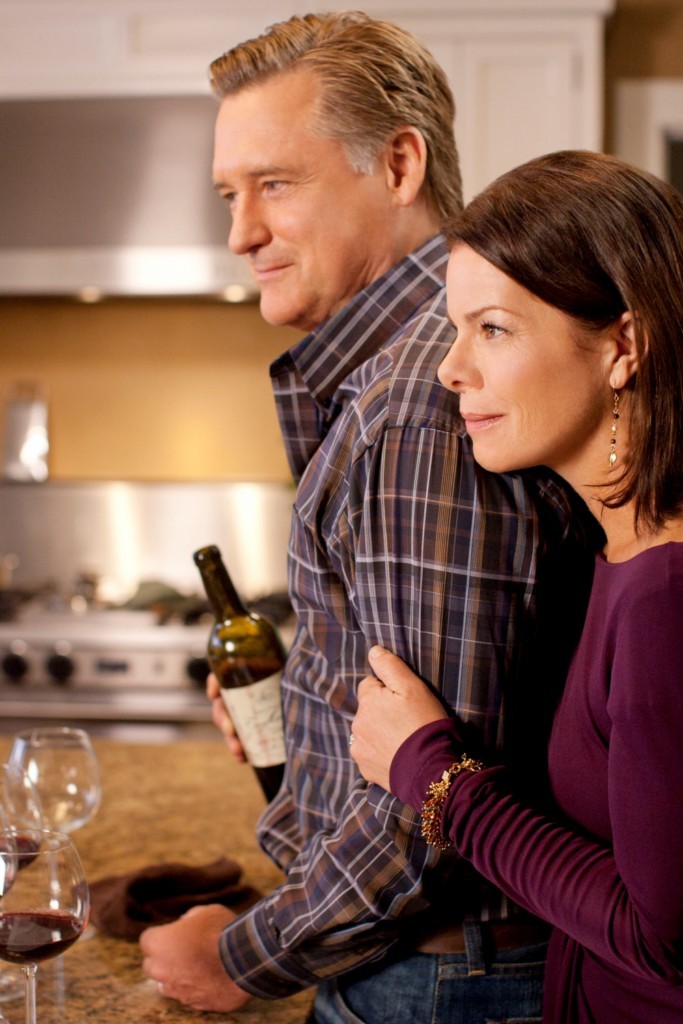 There's a lot of mystery
surrounding your character. She seems kind of unpredictable. How
did you prepare for the role?
There's a lot of mystery
surrounding your character. She seems kind of unpredictable. How
did you prepare for the role?
I studied. I did research. She’s
unpredictable in that she has a mental illness. There's a lot
written about borderline and bipolar and posttraumatic stress and
all of those. She’s unpredictable in that way. In fact, with her
medication, she’s very predictable. No judgment on whether the life
or the marriage is what it should be, but she seems to be
contained. This event throws her off balance. In the telling of
the story, you jump back and forth in flashbacks and
[screenwriter/director] Mike [Robe] has put the anger of the night
of the death at the very beginning. I hope that people were able to
understand that is what she had come to. But the other behaviors –
having dinner parties, making lunches, sending her kid off on the
bicycle – [were] hovering yes, overbearing possibly, but not crazy.
You said that you were familiar
with the novel prior to working on the film. How do you feel that
Mike Robe’s screenplay works off the novel?
Very well. In the novel, they
give you the perspective of is it two or three different people
telling the story? You can’t do that unless you sort of do a
French Lieutenant’s Woman on it. I feel like he did it very
well given that there are certain ways of telling the story that
can’t mimic the book. You get Rusty’s perspective much more – where
the book gives you the mistress’ perspective and the son’s
perspective. I thought it was super interesting that you don’t get
Barbara’s perspective, because if you think that Barbara killed
herself, the only way you would know for sure is if you get her
perspective. So in the book, I thought that’s interesting Scott
Turow didn’t give you the one. She’s the only one who can tell you
if she did it or not. I thought that was interesting and at the end
of the day, I was not necessarily convinced. I didn’t need to be
convinced that the story ended as both Scott and the director tell
you it did, because you don’t know unless she tells you that it
did.
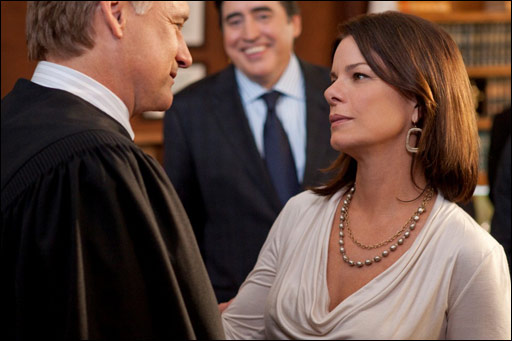 Now you touched on what I was
about to ask you, but I interviewed Scott Turow last year when the
book came out and he said between the two books, he didn’t really
see Barbara so much as the villain but more as sort of a tragic
character, almost noble in a strange way. How did you see her when
you were preparing for her and some of the acts that she did?
Now you touched on what I was
about to ask you, but I interviewed Scott Turow last year when the
book came out and he said between the two books, he didn’t really
see Barbara so much as the villain but more as sort of a tragic
character, almost noble in a strange way. How did you see her when
you were preparing for her and some of the acts that she did?
It’s interesting that you say
between the two as well because when Scott came to set, he said that
he’s often thought about writing a [story about] in-between Barbara
– during the middle of this and this 20 years. If you accepted the
first one has ended with her bludgeoning somebody, then in the
middle of this life, you have 20 years of Rusty, her husband, and
her covering her own violent crime. Then you pick up with them
again where she’s seemingly doing well. She’s on medication.
Things are going along fine, if not a little bit coolly. The story
begins to be told again because she’s revisited with the same
incident that has created extraordinarily erratic behavior – which
is his infidelity. So for me to have sympathy for her – or not even
sympathy, but let’s say empathy – I did a lot of research and a lot
of reading. A lot of those books that talk about what is the
devastation? What are the biochemical propensities of being
borderline? What would be expected? What is it like to
experience, to have your reality robbed from you? What can that
do? Why is that called crazy-making behavior? Literally cheating
is called crazy-making behavior at home, because it’s not truthful.
Truth balances people. Your reality is what you think it is and
untruth imbalances you. So I was certainly able to look at her and
understand her behaviors enough to not judge her, because that’s
always the death of an actor, when you start judging well they
shouldn’t have done this and they shouldn’t have done that, they
should’ve handled it this way. You have to just go what are the
circumstances? What are the realities? What is the research and so
that’s what I did. When I was playing her, I just felt like she was
such an incredible vessel in a way of pain. She had a lot of pain
and certainly guilt, but I certainly didn’t feel like she was a
villain. I felt like what her biochemical makeup is in conjunction
with what her environment is – which was an untruthful, cheating and
environment of infidelity – created erratic behavior.
There is another very acclaimed
performance of the same character in the past. Did you watch what
Bonnie Bedelia did with the same character in the original movie or
was that something you wanted to avoid so as not to influence your
take on it?
I had seen it years and years ago
when it first came out and so I didn’t feel the need to revisit that
beautiful performance. What I did was revisit the book and revisit
the character’s behavior so I could remind myself of 20 years ago.
What were her desires, what were her needs, what was her jealousy
and her rage? What did that look like?
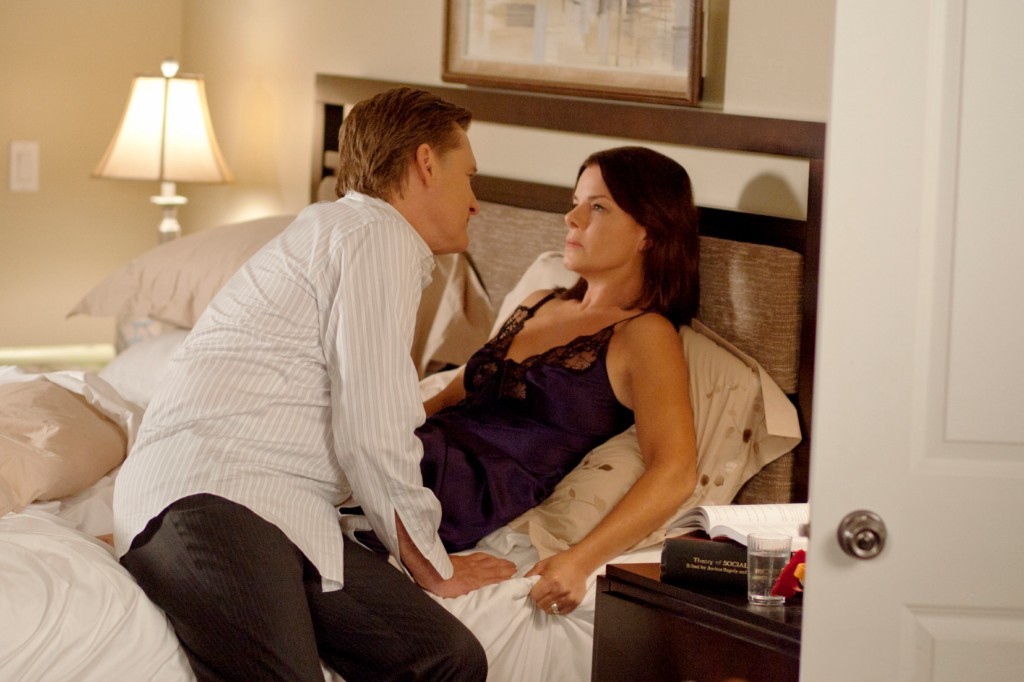 When you get a script like this
or any other script, is writing the only thing that you look for
when you decide whether you're going to accept it or not?
When you get a script like this
or any other script, is writing the only thing that you look for
when you decide whether you're going to accept it or not?
It’s as random as what clothing do
I put on in the morning. Really it is. It’s based on what my needs
are for the week, for the month, for the year, what I’m feeling like
on the day. What is the story trying to say? What does the
character say? What does it pay? Where does it shoot? Can I still
make the kids’ Christmas play if I do this and how can I work it
out? It is very random.
What other projects do you have
coming up?
I just did a week on Body of
Proof with Dana Delaney. Yesterday, I shot on a beautiful
little independent film called The Summer of Wine and Roses
playing an acting teacher. It was so much fun. I believe there's a
film called If I Were You that’s coming out that I did and
another one. There's just a couple of films coming out, but it’s
been a period of some change. We’ve moved out to California and
there are some family needs I’m taking care of so I can’t give you
laundry list of big films, but soon enough.
Sounds like you're keeping
really busy. Is it ever difficult to balance everything?
I am. Is it difficult? Yes, the
balls drop. Like with everybody, the balls drop all the time.
You’re juggling, juggling, somebody throws you a new one, and you
throw it in and dang it, another one dropped. If it weren’t for the
good friendship of many other moms that I know, I would say that the
balls would be scattered all over. But as Hillary
[Clinton] said, it takes a
village and I’m so grateful for the village that I have – the
friends that are there that pick up a ball and juggle it themselves
and throw it back in. Women and friendships and moms are really
strong community. It’s a strong chain and I’m lucky for that.
Between the mental illness and
the state of the marriage, Barbara seems like quite a demanding
character to portray. What would you say was most challenging for
you about the role and working on this project in particular?
I think to be subtle with the
repression and the things that were occurring in the life. The
barbs that don’t seem like barbs that she’s receiving and the barbs
that may not seem like barbs that she’s giving. To let that create
a history of disconnect for her and her husband, that leads to her
really erratic behavior surrounding her jealousy and her rage. And
she’s right to feel so. She’s justifiably enraged. It was her
particular behavior [which] is, I suppose considered erratic, but I
don’t know what sanity around those discoveries would look like
either. I suppose to not judge her would be the short answer.
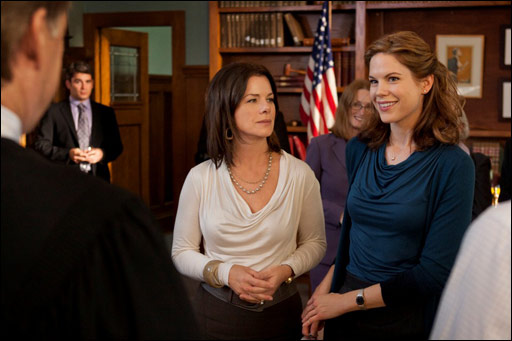 Can you tell us a bit about the
atmosphere on set? It’s a pretty serious movie, but the cast is
amazing.
Can you tell us a bit about the
atmosphere on set? It’s a pretty serious movie, but the cast is
amazing.
It was, to be almost mundane with
the word: it was so much fun. Alfred Molina just is full of banter
and wit and humor and keeps you laughing. Bill Pullman is just a
charming, gorgeous gentleman and Richard Schiff, all straight down
the line, the young actors, everybody, there was just a great
camaraderie. It’s always lovely as an actor when you jump into that
environment. Everyone’s there, in and out, in and out. You may not
have scenes together, but when you're on set together, its instant
familiarity, some spurred by years of knowing each other’s work or
having worked together. The actor jumps in with both feet on action
and you cross all kinds of boundaries and borders on action. That
allows for, on cut, bonding and it was really lovely.
You had mentioned some of the
things you had coming up, obviously a couple of years ago; you won a
Tony for God of Carnage. You said that you’ve been doing a lot of moving
around, but are you going to be doing any other theatre in the
future? Also have you heard anything about the new Carnage
movie or seen it?
The new Carnage movie came
out already so it’s out there for anyone to see. It’s a different
cast than ours was. It’s different, Polanski directing. I think
it’s probably a very different experience than the play. I have not
seen it yet, but I would like to. There was some talk about taking
Carnage to yet one more wonderful location, but that’s not
been confirmed yet so we’ll see. If it happens, I’m with it. I
love it. It was so much fun to do that play and there's always the
possibility of other things on Broadway, but doing theatre is
really… do you have kids?
No I don’t.
It’s so hard with children.
You're free when they're in school. You're working and they're out
of school and on the weekends. I have three kids. I have twins
that are seven and a 13 year old daughter. I just found it to be
almost untenable with the homework demands and the school demands
and the needs of the child. So I did it for quite a while and I
would do it briefly again, but I think another long run like that,
I’m going to have to wait a little bit to really examine that.
Email
us Let us know what you
think.